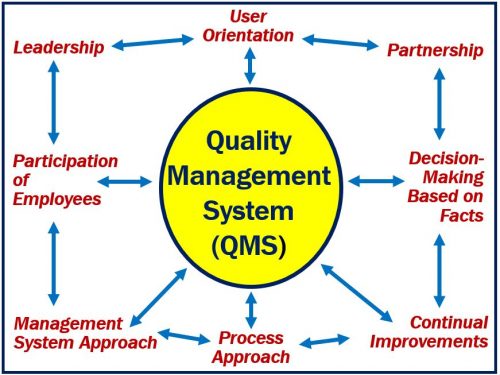A quality management system or QMS is a set of business processes that focus consistently on meeting customer requirements. It also focuses on enhancing consumer satisfaction. In this context, consumer and customer have the same meaning (in other contexts they might not).
A quality management system is a formalized system. It documents processes, procedures, and responsibilities for achieving quality policies as well as objectives.
QMS may not only focus on customer requirements but also regulatory requirements. Licenses, restrictions, and laws applicable to a product, for example, are regulatory requirements. The government typically imposes regulatory requirements.
The British Assessment Bureau has the following definition of a quality management system:
“A quality management system is a clearly defined set of business processes. Together with the relevant documentation, it defines your commitment to creating products and services in accordance with pre-defined standards.”
“A good QMS should include detailed information about processes and responsibilities within an operational environment.”
Quality management is everything that an organization does to make sure it produces and delivers goods and services to specifications. It also includes doing so at the appropriate cost. QMS is a system for doing all these things.
What does an effective QMS ensure?
An effective quality management system makes sure that a business delivers to a consistently high standard. It also includes a plan to continually measure and improve each aspect of a company’s business operations.
QMS mainly focuses on two targets:
- Meeting or exceeding customer requirements and expectations.
- Regulatory compliance.

QMS – meeting two key requirements
According to Business Balls, a fully-documented QMS will make sure that the business meets two important requirements:
- The Company’s Requirements – both externally and internally. The system will ensure the requirements are met with the best use of available resources and optimum cost. Materials, technology, information, and people, for example, are ‘available resources.’
- The customer’s requirements – this means delivering the desired product or service consistently, as well as meeting customer needs and expectations.
Regarding meeting these requirements, Business Balls states:
“These requirements can only be truly met if objective evidence is provided, in the form of information and
data, to support the system activities, from the ultimate supplier to the ultimate customer.”
Many types of QMS
There are several types of QMS. You should define what yours is first.
Not all industries or sectors are the same. Rules and regulations, for example, in the pharmaceutical industry are very different from those in banking and finance.
Some industries tell you what your processes must contain. In other words, some sectors tell you which QMS system to use.
In most industries, apart from compulsory codes of conduct, there are also voluntary codes.
Not all processes that are important in one industry matter in another. Even within the same industry, not every company has to follow the same processes.
A primary engineering business, for example, may require processes for product manufacture, new product testing, and product design. In a sub-contract business, on the other hand, just one process may be relevant.
Qualsys, a governance, risk and compliance blog, says that getting the right information to the right person at the right time is crucial. To be able to do this properly, you need the right quality management system software.
Regarding the different types of software, Qualsys says:
“Different types of QMS software support your business goals in different ways. Choosing the best QMS for your company requires looking at your objectives and determining the main quality challenges you need to resolve.”
Software, in this context, means computer program(s). We call the physical parts of a computer the hardware.
